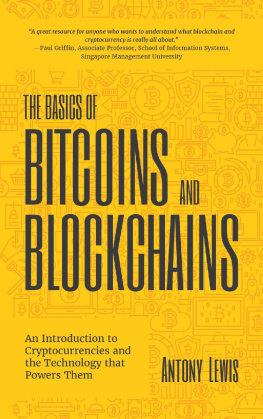Top 100 Cryptocurrencies
Mastering Cryptocurrencies
Leo Nordbo
Northern Light Publishing
Copyright 2020 Leo Nordbo
All rights reserved
Contents
Introduction
I am a computer science student and I felt like there was a void in crypto currency literature that needed to be filled out with a book that goes through the top 100 crypto currencies. I hope that this book will fill out that void.
Addresses for tips
Cardano (ADA):
DdzFFzCqrhssXe9GtiYjbsLP5KhWJ4SZ3BsHvSTKTCHqnCeSoUK5cwZEgzSyFqfAHoUC3sPYRAinY8rAJYcxnDLao8wcoKYmE5jKGvNx
Ethereum(ETH):
0x76b59e6851f9a1eCC732afF9cA584b21Cde84bb1
Bitcoin (XBT):
3HruA3bKy5U7hAJ4NxCaKA2XxUBruHNgBr
About Bitcoin
What Is Bitcoin?
Bitcoin is a completely decentralized digital cryptocurrency. Unlike US dollars that you can hold in your hand (or in your bank account), there is no central authority or centralized payment system controlling Bitcoin. Instead, Bitcoin operates in a peer-to-peer network that allows anyone in the world to send and receive Bitcoin without any middleman (like a bank, central bank or payment processor).
Bitcoin was the very first cryptocurrency ever created. On Oct. 31, 2008 a person (or group of people) under the pseudonym Satoshi Nakamoto published the now-world famous Bitcoin whitepaper
The first line reads: A purely peer-to-peer version of electronic cash, which would allow online payments to be sent directly from one party to another without going through a financial institution.
The Bitcoin network then launched on Jan. 3, 2009, marking the start of the cryptocurrency revolution.
How Does Bitcoin Work?
Bitcoin is a purely decentralized digital currency, which makes it unlike any other asset that came before it.
Before the digital age, everyone transacted in physical forms of currencies, from livestock and salt, to silver and gold, and finally to banknotes. Only in recent times was money digitized allowing bank accounts to exist online, as well as creating the many online payment processing platforms, such as PayPal and Square, that you often use today without thinking about it.
However, all of these digital transactions require a centralized system to operate. Your bank, or financial services like PayPal, needs to ensure that all of their users accounts are constantly updated and tallied correctly. These systems represent the centralized form of digital money.
Bitcoin revolutionized digital money by decentralizing this accounting process. Instead of a central figure that is responsible for making sure that their users transactions were always adding up, Bitcoin works by sharing the account balances and transactions of every user across the globe in a pseudonymous form. In simplest terms, this means that anyone can download and run the free and open-source software required to participate in the Bitcoin protocol.
As a Bitcoin user, all you need to know to send Bitcoin to someone else is their Bitcoin address (a series of letters and numbers, not their name or any personal information!). By sending your Bitcoin to an address, what you are doing is broadcasting your transaction (Hi, Im Alice sending 1 BTC to Bob!) across the Bitcoin network using blockchain technology (more about that below). Since the Bitcoin network has the most up-to-date ledger tracking Alices wallet balance, the system checks her wallet balance (i.e., Alice has 2 BTC in her wallet, so a transaction of 1 BTC to Bob is valid), and then completes the transaction.
In summary, Bitcoin works by ensuring that this shared ledger always tallies up, and that new Bitcoin transactions (Bob sends 2 BTC back to Alice. Go Alice!) are validated, recorded and then added to the ledger in order. That is the heart of blockchain technology, where new blocks of information are added to the chain of blocks that already exist.
How Does Bitcoin Mining Work?
Mining refers to the act of adding new blocks to the blockchain. In simple terms, Bitcoin miners dedicate significant amounts of computing power to solve a cryptographic problem, which is basically a very complex puzzle. The successful miner that solves the puzzle before all the other miners gets rewarded with a block reward, which is an allocation of a predetermined number of Bitcoin. In some cases, the block rewards are awarded to mining pools, when miners group together to share resources.
Once the puzzle is solved, the block is confirmed, and it is added to the blockchain. This new information is sent to all nodes, aka participants in the Bitcoin protocol, and the shared ledger is updated once again.
As Bitcoin's price rises, the block reward becomes increasingly more attractive. This incentivizes more miners to join in the competition to mine for blocks. In return, the more miners there are in the system, the more secure the network is. In addition, the increased competition also means miners are continually investing in newer hardware to ensure their computing power remains relevant for the fight for block rewards.
What Is a Bitcoin Halving?
To ensure that the value of Bitcoin is not compromised by an infinite supply, Satoshi Nakamoto wrote in a halving event that happens every 210,000 blocks. When Bitcoins network first began, Bitcoins block reward was 50 BTC per block mined. This was halved in 2012, at block #210,000, where the block reward became 25 BTC. The second halving was in 2016, at block #420,000, and the block reward became 12.5 BTC.
This process will continue every 210,000 blocks, until the total supply of BTC (21 million BTC) has been reached. It is estimated that the final block reward will be paid in 2140!
How Can I Store my Bitcoin?
There are many different ways of storing your Bitcoin heres just a few:
- Keep it on a Bitcoin exchange
There are many Bitcoin different exchanges all over the world. All of these exchanges allow you to sell Bitcoin for other cryptocurrencies (altcoins) or government currencies (USD, EUR, GBP etc.) At the same time, these Bitcoin exchanges allow you to store your BTC with them, which means that the burden of keeping it safe is on them. Do note that incidents have occurred when exchanges have been hacked or lost their customers BTC, so do your own research when youre looking for an exchange thats safe to hold your cryptoassets.
- Keep it in a Bitcoin wallet
Instead of keeping it on a Bitcoin exchange, you could keep your Bitcoin in a Bitcoin wallet instead. Wallets come in two forms hot and cold. Hot wallets are software that stays connected to the internet, aka storing your Bitcoin online. It is more convenient to transact via a hot wallet, but they logically are more susceptible to being attacked, as they stay connected to the internet.
Cold wallets are wallets that are not online. They are less prone to attack, as hackers cannot access this type of cold storage via the internet, but they are also a lot less convenient for the user as they may be cost-prohibitive and require more technical understanding to operate. Examples of cold wallets are hardware wallets and paper wallets.
About Ethereum
What Is Ethereum?
Ethereum is a smart contract platform that enables developers to build decentralized applications (DApps) on its blockchain. Ether (ETH) is the native digital currency of the Ethereum platform.
Ethereum is supported in part by the Ethereum Foundation, a non-profit that is part of the larger Ethereum ecosystem including enterprise Ethereum consortiums like the Ethereum Enterprise Alliance.
How Does Ethereum Work?
Vitalik Buterin first conceptualized Ethereum in 2013 with the idea of developing an open-source blockchain platform different from Bitcoin (BTC), thus pioneering smart contracts. On the Ethereum blockchain, a smart contract behaves like a self-operating computer program that automatically executes when specific conditions are met. Blockchain allows smart contracts code to be run exactly as programmed without any possibility of downtime, censorship, fraud or third-party interference.










![Arvind Matharu [Arvind Matharu] - Understanding Cryptocurrencies](/uploads/posts/book/119680/thumbs/arvind-matharu-arvind-matharu-understanding.jpg)